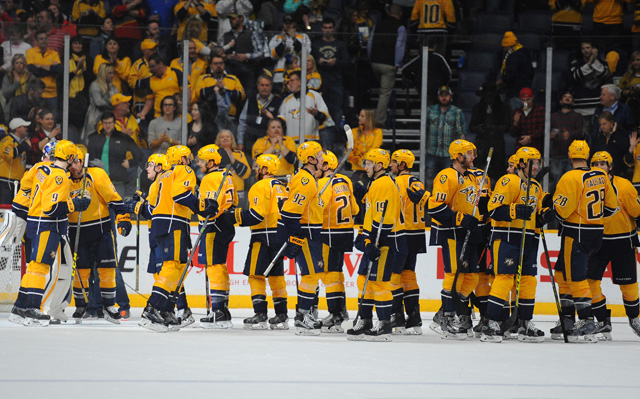
When third-round pick Jimmy Vesey reportedly informed the Nashville Predators that he will not be signing with them, opting instead for unrestricted free agency, it fanned the fires of debate. Even though he is not the first player to exercise this option, or maybe because he isn’t, there has been a lot of chatter about what happened, what can be done about it or even if anything should be.
With all of that in mind, here's a primer on what we know to date and why this rule, while imperfect, is probably better than the alternative:
1. Vesey did not exploit any loopholes to choose free agency over signing
The first word you have to rid from your vocabulary in situations like these is “loophole.” Vesey did not use a loophole to go to free agency, plain and simple. He is using a written rule that is collectively bargained by the NHL and NHLPA.
NHL teams have four years to sign a player so long as he remains a bona fide college player for that entire time. When that player either leaves school or graduates, he opens up the possibility of being a free agent four years removed from his draft.
This has been used several times before and while it’s unfortunate for the drafting team, a player is well within his rights to use this option.
2. The Predators say they were assured on multiple occasions that Vesey would sign
This is the part where things get uncomfortable.
Assistant GM Paul Fenton explained the team’s side of the story in a radio interview with Sportsnet’s Hockey Central show Tuesday:
“I spoke with Jimmy Vesey after the [Beanpot Tournament] consolation game in early February and asked the player three times if he was signing with us,” Fenton said. “I realized he was in a tough position here, but that we needed to know from a lineup standpoint and from our trade deadline plans as to what he was going to do and we would not fill his spot.
We believed he had top-six potential to play for us.”
Fenton then confirmed that Vesey said he wanted to sign with the Predators each time he was asked.
Based on those assurances, the Predators decided to stand pat at the deadline. Vesey was going to cost them nothing more than a contract. They wouldn’t have to give up any assets in a trade, but would get a potential scoring winger into the fold. That’s the best kind of acquisition.
Somewhere along the lines, things changed for Vesey.
Fenton said that the fact that they let the information on Vesey’s intentions at the time affect their trade deadline plans was what stings the most about his particular instance.
“In this business you have highs and you have lows,” Fenton explained to the Hockey Central crew. “This is one of the lows.”
In that same interview, the assistant GM was asked if there were any suspicions of tampering, but Fenton said he wouldn’t go down that road. However, on Monday night when Predators GM David Poile addressed the news that Vesey wasn’t coming, he said he believed the player was receiving bad advice, probably referring to the player’s representation.
Fenton also echoed Poile saying that the Predators aren’t closing the door on signing Vesey. They still have the exclusive negotiating rights to him until Aug. 15 unless they decide to trade him first. On Aug. 15, Vesey is free to be signed by anybody. T
he Preds assistant GM said that they still haven’t even had a chance to sit with Vesey and his representatives. The chances of that ever happening though seem pretty slim.
3. Vesey is giving up a ton to explore free agency
When it comes to Vesey’s decision, he’s simply exercising an option available to him under the terms of the collective bargaining agreement. He’s leaving a ton on the table to go to free agency, so let’s not pretend like this was some easy decision to not sign with Nashville. With all due respect to the 29 other teams, there isn’t one that could have offered anything more than Nashville could.
For one, the max base salary Vesey can sign for is the same as everyone else under the entry-level contract: $925,000. Secondly, the Predators were the only team that could offer him the opportunity to burn the first year of that entry-level deal off. That gets him a full year closer to restricted free agency and a potentially bigger contract. They also were saying he could play a big role on a playoff team right away. Again, no one else could offer that.
Craig Custance of ESPN.com made a smart career-track comparison between Vesey’s situation and that of Anders Lee of the New York Islanders. Lee opted to sign with the Islanders instead of test free agency. Using that career comparable, Vesey is more than likely leaving money on the table not just for this year (a $92,000 signing bonus plus pro-rated salary), he could be costing himself in the millions of dollars over the next four years by remaining in the restricted free agent system a year longer than he would if he signed with Nashville, assuming he hits what his potential suggests.
However, the feelings of uneasiness over what Vesey apparently told the Predators ahead of the trade deadline is only natural. Saying one thing and doing the other just a few months later is at least unsettling, and at worst, suspicious. Either Vesey really, really didn’t want to play in Nashville, or he just really, really wanted to pick from any number of teams that will sign him to a contract. That still leaves the question of what changed between when he talked to Fenton and the decision to hit free agency Monday.
Another important thing to remember in all this, we still haven’t heard Vesey’s side of the story and may not for a bit.
4. Should the NHL/NHLPA change the rule that allows this to happen?
This is a fascinating question that is difficult to answer. This is the more pertinent question to me, however: Should teams be allowed to retain draft rights for an unlimited amount of time? That’s the part that is unrealistic to me. There has to be a cap. A four-year period to negotiate is more than generous.
The Predators had four years to sign Vesey, essentially. He clearly wasn’t ready for the pros after either his freshman or sophomore year. Additionally the Predators have their own policy, according to Fenton, that they won’t pressure players to leave school early. The contract will be there if they want it.
Vesey also was very much committed to finishing his degree. Along the way, he grew into the explosive offensive talent. He chose not to sign after his junior season, played through his senior season and this option became available to him.
Another thing to remember is that the NHL Draft benefits the teams far more than it does the players. Sure, for some players there is better assurance of a pro contract, but the team can opt to not sign a player. That’s just part of the business. So is the decision Vesey made, as it was mutually agreed upon by the NHLPA and NHL. Most players will never have the opportunity at any point in their career to pick the team they want to play for. Vesey does now.
The Predators have every right to be upset about this. They made the investment with a draft pick, they had Vesey participate in development camps and worked with him while he was in school. They also had the best offer of any team. They also apparently had assurances that Vesey was coming. All of that put together makes for a very frustrating cocktail.
However, what happened was always going to be a possibility. That's the way the system is set up right now. Players get burned all the time in this same system. Occassionally the teams will, too.

















